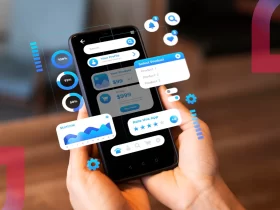Image Credit: https://www.istockphoto.com/photo/shot-of-a-young-male-engineer-working-in-a-server-room-gm1332104710-415045231?phrase=IT%2BSupport
Managed IT services refer to the various forms of assistance and support provided by information technology professionals to individuals, businesses, and organizations. These services may include hardware and software installation and maintenance, network management, data backup and recovery, cyber security, and cloud computing. IT services can also include consulting, training, and technical support.
Different types of managed IT services
Network infrastructure management
Network infrastructure management refers to the process of maintaining and administering the hardware and software components of a computer network. This includes tasks such as configuring network devices, monitoring network performance, and troubleshooting issues. The goal of network infrastructure management is to ensure the smooth and efficient operation of the network and to minimize disruptions to network services.
On-demand IT services
On-demand IT service refers to the provision of IT services and support as needed, rather than on a set schedule or contract basis. This allows businesses to only pay for the services they use, and to scale their IT support up or down as their needs change. Examples of on-demand IT services include cloud computing, software-as-a-service (SaaS), and managed IT services.
Hardware support
It refers to the maintenance and management of a company’s physical computer equipment, such as servers, desktop computers, laptops, and printers. This can include tasks such as troubleshooting hardware issues, repairing or replacing faulty equipment, and upgrading hardware to improve performance and security.
Managed IT service providers typically offer hardware support as part of a comprehensive package of IT services, which also includes software support, network management, and data backup and recovery.

Image Credit: https://www.istockphoto.com/photo/shot-of-two-colleagues-working-together-in-a-server-room-gm1332104905-415045451?phrase=IT%20Support
Software services
Software services are related to maintaining, updating, and troubleshooting software used by the organization. This can include things like operating system updates, security patches, and software installations. Managed IT service providers may also offer monitoring and management services for specific software, such as email or productivity software. Additionally, software services may include helpdesk support for users experiencing software-related issues.
IT communication services
Various methods and tools are used to facilitate communication between IT staff and clients. This can include email, phone, and online chat support, as well as remote access and remote desktop tools that allow IT staff to access and troubleshoot clients’ systems remotely.
It can also include project management and ticketing systems that allow clients to submit and track support requests, as well as communication and collaboration tools that allow IT staff to work together and share information effectively.
Mobile device management
Small businesses are often reliant on mobile devices to help them stay connected and productive. Mobile device management (MDM) is a type of IT service that helps businesses manage and secure their mobile devices. It helps businesses keep track of all the mobile devices that are being used by employees. This includes keeping track of who is using which device, what apps are installed on each device, and where the devices are located.
One of the most important aspects is to secure the data that is stored on employees’ mobile devices. This ensures that data is encrypted and backed up, as well as manages access to corporate data.
Cloud managed services
It generally includes daily management and monitoring of the cloud environment including –
- Configuration
- Performance
- Security & Compliance
- Governance
- Capacity management
- Cost optimization
- Financial management
Cyber security services
The majority of the above services cover cyber security to some extent. If your business works with confidential data then it is worth choosing this kind of service from experts. They employ a solid cyber security strategy with several protection layers to protect against cyber-attacks to gain access, destroy or change data, extort dollars, or aim to upset normal company operations. They create a clear roadmap after a thorough risk assessment and gap analysis.
The goal of IT services is to help clients effectively use and manage their technology resources to meet their business needs.






